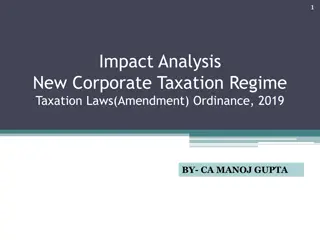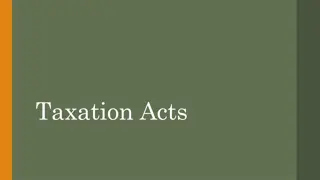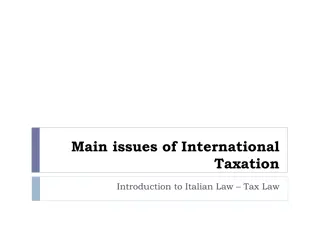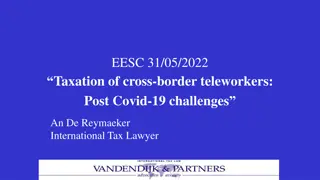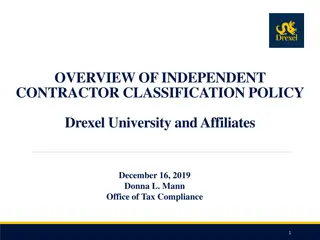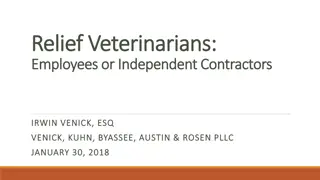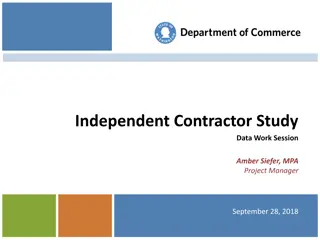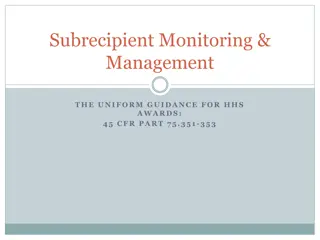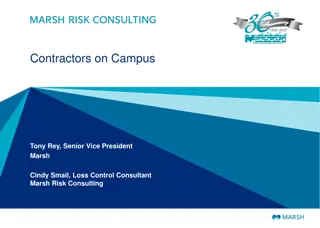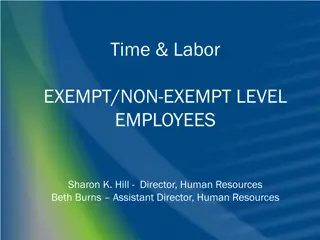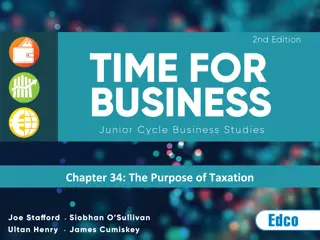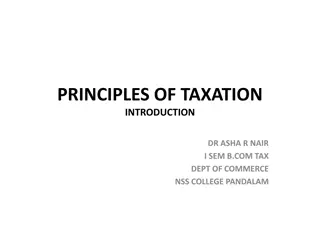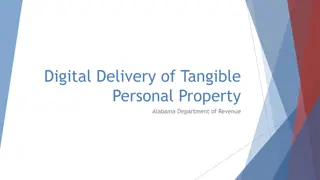Understanding Employee vs. Independent Contractor Distinctions in Taxation
Explore the nuances of classifying workers as employees or independent contractors, delving into the implications, control factors, financial considerations, and relational aspects involved. Gain insights into the IRS's classification rules and the importance of compliance to avoid penalties.
Download Presentation

Please find below an Image/Link to download the presentation.
The content on the website is provided AS IS for your information and personal use only. It may not be sold, licensed, or shared on other websites without obtaining consent from the author. Download presentation by click this link. If you encounter any issues during the download, it is possible that the publisher has removed the file from their server.
E N D
Presentation Transcript
Employee or Independent Contractor? UW Campus Tax Training
Outline What is an Employee, What is an Independent contractor. Why should we care about the difference? Classification Rules 20 factor test UW Policy Case Studies
Employee Independent Contractor When the person for whom services are provided has the right to control or direct only the result of the work and not the means or the methods of the work IC has flexibility to purchase and structure own benefit plans Provide form 1099, as opposed to W-2 No withholdings Anyone who performs services for a business where UW controls what will be done and how it will be done. Must pay benefits such as vacation, health, etc. Must remove (i.e. withhold) taxes from paycheck and provide W-2 3
Why do we care? Because the IRS cares A LOT! Because we want to be compliant with the law Because penalties can be steep
Classification Rules Look at control: Behavioral control Financial control Look at Relationships
Behavioral Control Do we have the right to direct or control the worker? Indicators of behavioral control When to do the work Where to do the work How they do their work What tools are used What order or sequence to follow Is prior approval required?
Financial Control Indicators of a independent contractor: Significant investment in equipment Unreimbursed expenses Have fixed costs Services available to the market Paid a flat fee
Type of Relationship Written contracts But substance, not label rules Employee benefits Permanency of the relationship Services provided as key activity of the business
Factors to consider Specific factors that are used by the IRS in determining whether an individual is an employee or an independent contractor. The listing is commonly referred to as the "20 factors" test. No one factor is determinative. Need to weigh all the facts and circumstance. The twenty factors are not all inclusive and other factors might come into play.
20 factors Test Note: "Yes" answers are indicative of employee status per IRS 1. Worker is required to comply with instructions about when, where, and how work is done. 2. Worker needs to be trained. 3. Worker's tasks are integrated into normal business operations. 4. Worker's services must be personally rendered. 5. Worker is not responsible for hiring, paying, or supervising assistants.
20 factors Test 6. Worker has continuing relationship with "employer". 7. Working hours are set by "employer". 8. Worker is required to devote full-time efforts to "employer's" business. 9. Worker must perform or execute duties on "employer's" premises. 10.Worker's services must conform to order or sequence set by "employer".
20 factors Test 11.Worker is required to submit regular oral or written reports. 12.Worker's payment is based on time spent instead of by the job. 13.Worker is reimbursed for travel and other expenses. 14.Worker is furnished tools, materials, and other equipment by "employer". 15.Worker has no significant investment in facilities (such as an office).
20 factors Test 16.Worker has no risk of real economic loss. 17.Worker is not working for more than one "employer" at a time. 18.Worker does not make services available to the general public. 19.Worker is subject to discharge without "employer" penalty -- even if job specifications are met. 20.Worker can terminate relationship with "employer" without worker liability.
Who is an Employee - Recap UW has the right to control the work UW provides all supplies and equipment UW pays individual on an hourly, weekly, monthly basis UW provides benefits health insurance, vacation time, sick leave Performing a core function of the UW
Forms and taxes for employees Federal income tax withholding Social Security and Medicare taxes (FICA) UW matches the amount Federal unemployment tax W-2 reporting of income and withholding
Who is an Independent Contractor - Recap UW has the right to control or direct only the result of the work IC gets fixed payment regardless of hours worked IC performs same services for other organizations IC supplies own equipment
Taxes and forms for independent contractors IC is responsible for paying estimated taxes on income IC is responsible for paying self-employment tax UW reports income on Form 1099 MISC
How do I make the determination? Look at all facts and circumstances Use twenty factor test as guideline Form 1631/1632 Make the determination before a contract is signed with the individual May have to go back and pay them as an employee. Is there a breach of contract?
Tricky situations Contract with person s corporation, not individual, ok if: Corporate formalities are followed At least one non-tax business reason exists for contracting with company LLC? May not be a corporation!
Independent Contractor Policy (APS 32.3) Revised November 2012 Current UW employee cannot be paid as a contractor at the same time, regardless of differences in work provided Doesn t matter if different department Pay as FEE or URD earn types through Payroll
Independent Contractor Classification Consequences Ind. Contractor UW Taxes Individual responsible for self-paying all taxes Does not withhold any taxes. Reports income on 1099 Benefits Not entitled to UW benefits Provides to benefits to ICs Workers Comp. Individual required to obtain own coverage Does not cover ICs Consequences of misclassification Back taxes, penalties, and interest (can be steep!) Falls on UW and individual
Case Studies UW professor of psychology Business school asks him to give a lecture on Psychology of Wall Street traders and will pay him $200 for the lecture. Pay Prof as EE or IC?
Case Studies Jane was laid off in June due to budget cuts. Her former department wants to hire her as an independent contractor for 40 hours in August to finish up the project she was working on because they have found some temporary funding. What should the department do?
Case Studies Law school hires Ima Lawyer, in November, as an independent contractor to advise the tax clinic on low income taxpayer IRS options. They like her so much they want to hire her as a permanent staff. Can they?
Case Studies Art department wants to hire the company, Studio Bonzai, to do some design work Studio Bonzai is owned and operated by current UW employee Is this okay?
Case Studies Mark leaves UW Fisheries department in December, 2010 to work on The Deadliest Catch TV show. The show goes off the air in January and Fisheries wants to hire Mark to give a lecture on how to get on a TV fishing show. They want to hire him in March 2011 as an independent contractor. Can they?
Questions? & Resources http://www.irs.gov/businesses/small/article/0,,id =99921,00.html IRS Publication 1779 @ IRS.gov Tax Office Website: http://f2.washington.edu/fm/tax/fed- taxes/employee-independent-contractor APS: http://www.washington.edu/admin/rules/policie s/APS/32.03.html Tax Office: taxofc@uw.edu



